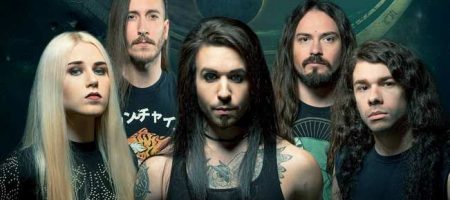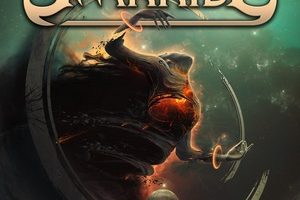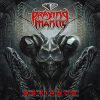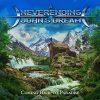Starkill – From Chicago, Not Finland
Sunday, 12th October 2014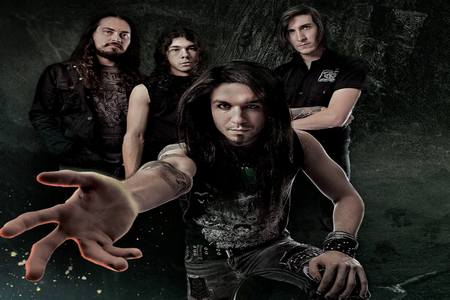
Starkill made a big splash onto the metal scene last year with their debut, Fires of Life. Since then, they’ve been touring the globe in support of said album with bands like Wintersun, Amorphis, Turisas, Fleshgod Apocalypse, and Krisiun. Somewhere along the way, Starkill found the time to write Virus of the Mind, their new album. Releasing this week, Virus of the Mind is a more mature Starkill, going in darker directions as well as introducting new ideas such as clean vocals.
But things always haven’t been completely smooth for the band. Before hitting it big with Starkill, they shifted between a few band names. After Fires of Life, the band lost two members and needed to fill in those gaps. With the band’s quick success and touring ethos, we at DR decided there was plenty to discuss with vocalist/guitarist Parker Jameson, who was happy to chat with us on a Sunday afternoon.
Dead Rhetoric: Virus of the Mind, overall seems a bit darker. What made you decide to go that route?
Parker Jameson: I think one of the biggest differences that contributed from the change in sound from the first album was that Fires of Life was written when we were between 14-18 and had been listening to metal for about a year. We didn’t have that much diversity or knowledge when we were writing the album. With Virus, five more years had gone by and we had changed two different members and we were really influenced from the past year of touring. Big bands like Wintersun and Amorphis, both consciously and subconsciously, permeated into our writing style.
The framework of like half of the album had been laid down already because we are recording all the time. Then we did the Wintersun tour, came home, spent like two months cleaning up and adding new things we kind of picked up from Fleshgod Apocalypse and Wintersun on that tour, which got the album to about 75% completion. Then we went out on tour with Amorphis and came back and added more. You can hear and feel that progression going.
Dead Rhetoric: When you had made those [initial] recordings that eventually ended up on Fires of Life, that was back when you were Ballistika?
Jameson: Most of the stuff that was on Fires of Life was stuff we wrote back in our formative years, when we were still at college and going through different name changes. We re-recorded it and stamped the Starkill name on it because we wanted those songs to be out there, but they were some of the first songs that we had written. With Virus of the Mind, we had maybe 30-40 songs in the bank, or at least ideas, and we really got a chance to filter through and pick and choose which ones we through worked more cohesively with each other. There was a lot more thought that went into Virus of the Mind and we had a lot more options.
Dead Rhetoric: So you started as Ballistika, then you changed to Massakren, and ended up with Starkill. Why did you go through those name changes?
Jameson: We actually were working with Century Media on releasing Fires of Life. We signed with them and had 8 months to figure out our school situation because we were still in college at the time. We were in the studio for a few months and then we had to mix it and we had to figure out the right time to release it with touring. Before we released it, I was always wishy-washy with the name. I knew that, especially with the Massakren EP, there was a purist black metal subsection that was like, “this isn’t black metal, this is fucking stupid” and there were other people that were really confused, and in all honesty, we were pretty god damn confused. We were 14 and 18 and had no idea what we were doing and for some reason we wore corpsepaint for no fucking reason. And as we got older we thought that was really dumb, because were aren’t remotely close to that but there are some blackened tinges and we are influenced by Behemoth, Dimmu, and Immortal.
When Fires of Life was pretty much done, we hadn’t sent it to be printed yet. I knew that some of the material and sounds that are now on Virus, that stuff was cooking in my head. I knew we needed a name and a look that wouldn’t really pigeonhole us into people expecting more traditional black metal. I’m a huge fan of bands like Amorphis, Nightwish, Insomnium, and In Flames and I knew I wanted to have more of that stuff down the road and I wanted a name that was a bit more all encompassing. A lot of people thought the label did it, but it was all by choice.
Dead Rhetoric: It makes sense if you are trying to avoid those things and I think it comes off the tongue a bit better than the other names.
Jameson: The funny thing is, as soon as we switched the name and changed the look, songs that were being labeled as black metal all of a sudden became labeled as melodic death metal. Nothing changed except the name and the look.
Dead Rhetoric: There are two new members [Tony Keathley and Shaun Andruchuk] in the band for Virus of the Mind; how do you think that affected the songwriting process?
Jameson: I was pretty devastated when Charlie [Federici] left the band. He was my best friend and we formed the band when we were at college. There were no hard feelings, he just wanted to go back to school and the touring life is pretty insane if you aren’t accustomed to it, and we weren’t. You figure this stuff out as you go along and it wasn’t really for him. I think some of that emotion kind of translated into the lyrics and the writing and the keyboard parts, but the new line-up we have going on is really the best thing that happened to us. Tony Keathley is the new guitarist. I had gone to high school with him, but he was in a little bit of a different social clique because he was older and I was way introverted in high school so we never spoke. But I hit him up and we hit it off, he was in the music industry and does sound for a couple bands and knows the touring lifestyle. The chemistry between the band is 8 million times better than what it ever was so it really helps on the road and live. Tony and Shaun, who is the new bass player, they filled in a lot of gaps in these recordings and brought a uniqueness to the album.
Dead Rhetoric: You used clean vocals on the new cd. Was it just that it fit the parts better?
Jameson: It was something that I always wanted to have in our music but never publicly practiced or sang in front of people before. It wasn’t something I knew I could do. Back when we were in college and we had all of the name changes going on, I wasn’t even going to be the vocalist; we had someone else do the death metal vocals until I taught myself how to do it. When we toured with Fleshgod and Wintersun, they have a lot of cleans in their stuff and I really admired it, it was like, “damn I wish we could have this stuff in our new material.” When the tour was over and we came back, I started kind of tinkering and recording and I thought I should set this up and see if it can work. When we did the Amorphis tour that was what really hammered it into my soul. Watching Tomi [Koivusaari] sing every night was just blowing my mind and bringing these new melodies and connecting with the audience so when we came back from that tour, we went into the studio and we recorded “Winter Desolation.” We then brought that song out when we went out on tour with Turisas and we did it as a trial run. It worked and it was a fan favorite every night so we said okay, let’s bring this element to most of the album and it worked really well.
Dead Rhetoric: I agree, I think it adds some diversity too. Was there any trepidation, other than learning to do it, knowing that many bands use that “clean/growl” pattern?
Jameson: I know what’s going to happen is that we are going to lose a small section of the fanbase who says, “this is stupid, this is sellout stuff.” It’s not, it’s an instrument. You don’t yell at bands saying, “this band has a bass, I’m never going to listen to this band.” It’s an instrument, it’s another way of conveying parts of the song. I think it’s going to open up a lot more doors. I purely did it for a songwriting purpose. It wasn’t to get new fans or anything. It was just the best instrument to fit the part. I’m happy with it and I guess that’s what matters.
Dead Rhetoric: It doesn’t really have that “poppy” sense, so no one really should be accusing you of trying to sell out. It doesn’t really go in that direction.
Jameson: We spent a lot of time writing the harmonies and a couple parts Tony sings live and we did have to tweak his vocal style also. We wanted to be very careful to not have it sound poppy or like some of these post-hardcore bands that I absolutely abhor. I wanted to make it sound like a deeper kind of style. Fortunately that’s how my voice sounds; if it didn’t sound like that then we wouldn’t have done it but I think it’s a bit melancholic for the music, which is fitting.
Pages: 1 2












